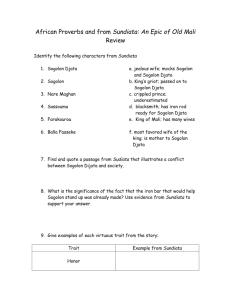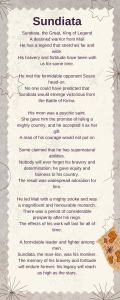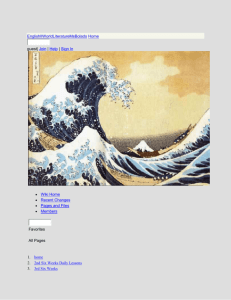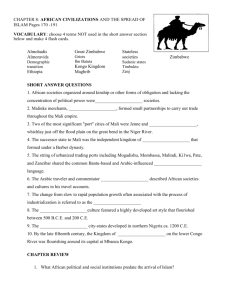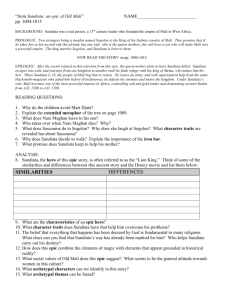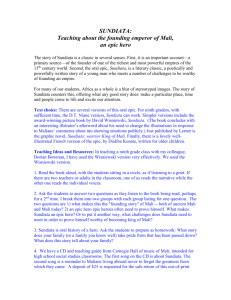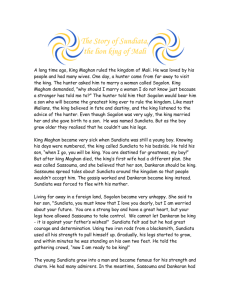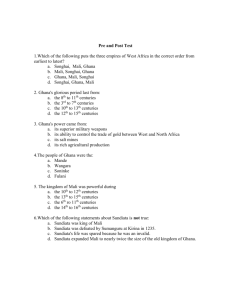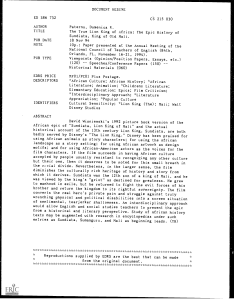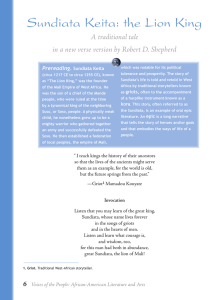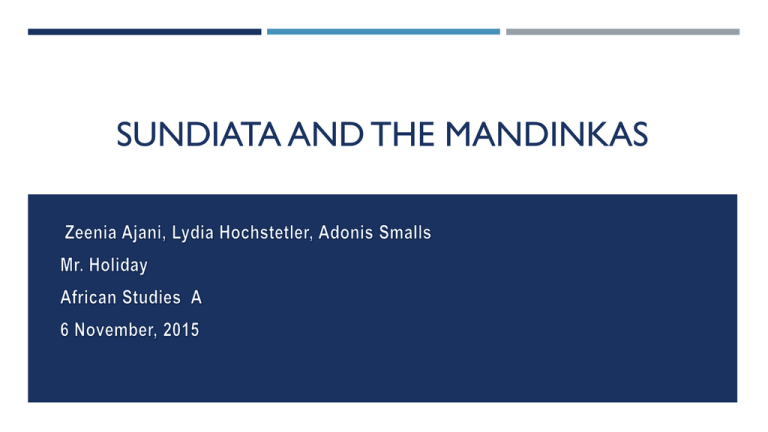
SUNDIATA AND THE MANDINKAS
PRESENTATION OVERVIEW
Goal:t To explain the recurring theme of destiny that highlights the importance of
religion in the Mandinka Society.
Agenda:
• Background of the Mandinka people.
• Background of Sundiata.
• Information on Religious practices.
• Examples of destiny presented in the text
THE MANDINKAS
Mandinkas were mainly in West Africa
Mandinka
Mande
Bambara
Mandingoes
Maninka
Manding
(Lindsey)
THE MANDINKAS
The Mandinka people:
-Population: 2 million
-Language Family: Niger-Congo Language Family
-Primarily Islamic (99%)
-Location:
In between the Sahara Dessert
and the tropical forest (Atlantic
Ocean)
-Descendants of Mali Empire
-Founded by Sundiata in 1235
-Originated in Western Sudan
-Economy: Agricultural (peanuts,
maize, rice, millet)
(Lindsey)
SUNDIATA : AN EPIC OLD MALI
Most likely originated in the 14th Century
Numerous translations and versions
Quasi-historical basis
PLOT SUMMARY
Prophecy of the Great Lion Child
Birth of Sundiata Keita
Ascension of Dankara Keita
Exile
The Sorcerer King
The Final Battle
Fulfillment of the Prophecy
THE BAMBARA RELIGION
“Religion is the way of life” (Khapoya 43).
Spirits
• Jinnis
• Nature
• Wraiths
Faro
The Ancestors
The Elders
Sorcerers
(Niane xii)
THE RECURRING THEME OF DESTINY HIGHLIGHTS THE
IMPORTANCE OF RELIGION IN THE MANDINKA SOCIETY
The King uses soothsayers to understand his destiny, He wants to be sure he has a chance to become
powerful:
A hunter/soothsayer said, “I see two hunters coming to your city; they have come from afar and a
woman accompanies them. Oh, that woman! She is ugly, she is hideous, she bears on her back a
disfigured hump… but mystery of mysteries this is the woman you must marry, sire, for she will be the
mother of him who will make the name of Mali immortal forever” (Niane 5).
AND SO HE DOES:
“The king considered her for a moment, then the handsome Maghan turned away… the griot understood all
the sovereign’s embarrassment” (Niane 7).
Firmly
decided
To celebrate a
marriage with
religious rights.
“Nare Mahgan [the king] determined to solemnize his marriage with all the customary formalities so that
no one could dispute the rights of the son to be born to him” (Niane 9).
EXILE AND GROWTH
“Sassouma Berete thought herself victorious because Sogolon and her children had fled from Mali. Their feet
plowed up the dust of the roads. They suffered the insults which those who leave their country know of.
Doors were shut against them and kings chased them from their courts. But all that was part of the great
destiny of Sundiata” (Niane 28).
“To be banished from one’s group, for any reason, was to have one’s life hang in the balance, to be at high risk.
One simply could not survive on one’s own” (Khapoya 37).
WORKS CITED PAGE
Khapoya,Vincent B. "8." The African Experience: An Introduction. 2nd ed. Kinshasa: Prentice Hall, 1998. Print.
Lindsey, Fred. “Mandinka.” Encyclopedia of the World Cultures Supplement. 2002. Encyclopedia.com 3 Nov. 2015
Niane, Djibril. Sundiata: An Epic of Old Mali. Comp. Djeli Mamoudou Kouyate. Rev. ed. Kinshasa, Democratic
Republic of the Congo: Pearson Longman, 2006. Print.
THINGS YET TO BE COMPLETED
Full citations, guys can you please send me the links to the photos you used so I can cite them.
I think a quote after the presentation overview slide would be nice.
One font throughout, and what font size is perfect.

